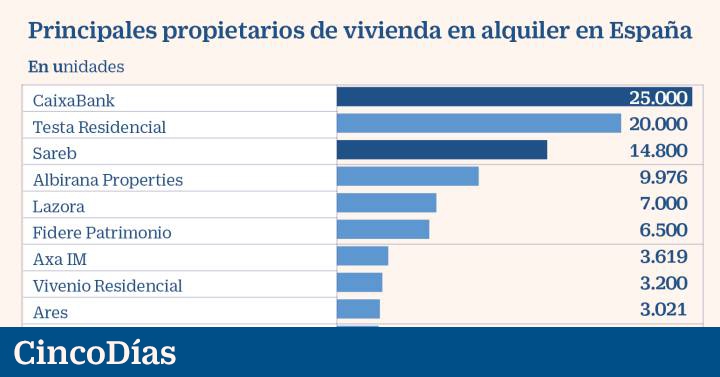Who are the large rental homeowners and how many houses do they have?
Blackstone, Caixabank and Sareb are the big holders in a very fragmented market in Spain, according to a study dated December by Atlas Real Estate Analytics, advanced by
Cinco Días
.
By entities, Caixabank is the one with the most houses available for lease, 25,000, according to this report, mainly through the Building Center company.
Although the great owner is the American fund Blackstone, with almost 40,000 houses, scattered in various societies.
The main one is Testa Residencial, with 20,000 units, the Socimi acquired from Merlin, Santander and Acciona.
This fund is followed by Albirana (9,176 homes; Fidere (6,500); Torbel (2,170) and the servicer Anticipa (1,500).
As the third major owner appears the
bad bank
Sareb.
The consulting firm Atlas collects 14,800 houses for rent.
Although Sareb clarifies that they currently have 6,883 leases in the free market and 2,700 arranged in agreements with public administrations such as social housing.
The financial entity recently announced that its park available for agreements with municipalities and autonomous communities reaches 10,000 units.
The Atlas report includes that among the 40 large owners they have 115,085 houses, which means that they control 4.2% of the residential park for rent.
That small percentage makes it very difficult for them to pressure or influence the rise in rent prices, as suggested in the past by political groups such as United We, especially, directing their reproaches to the Socimis.
As Socimis, among the large owners in addition to Testa, Vivenio (from the Dutch fund APG and Renta Corporación) stands out, with 3,200 houses.
Likewise, Tempore (from the Texas fund TPG and Sareb) has 2,565 units.
The aforementioned Albirana and Fidere, from Blackstone, are also governed by the tax figure of the Socimis.
The arrival of these funds and institutional investors in recent years is similar to what happens in other European countries, where the presence of this type of capital is more frequent, in many cases also linked to housing parks built in the past by the public sector and by large corporations.
From the real estate sector, it is seen as an opportunity to create in Spain this type of buildings with high demand, with industrial capacities of scale that lower costs, that renew a very old park and with professional management of the lease, which in the country is controlled currently by individuals.
Among the new large owners are funds such as Ares (3,021 houses), with a relevant investment position, as well as the insurance company Axa (3,619 apartments).
Among the pioneers in the sector are Lazora (7,000 units) and Encasa Cibeles, from Goldman Sachs (2,935).
With a smaller presence, financial entities such as Sabadell and Liberbank also stand out.
The consulting firm Atlas calculates that in Spain there is a deficit of 1,841,440 rental homes, taking into account the demand for rental, the current residential stock and the comparison with European countries.
Currently in the country, 24.1% of the houses in Spain have a lease (15.4% in the free market) compared to 28% on average in Germany, France, the United Kingdom and Italy.
The interest of the private sector is justified by the enormous demand for this product in large cities.
"As far as access to housing is concerned, Spaniards have increasing pressure to opt for rent instead of a home that they own that is increasingly far away," the document reflects.
Companies replace individuals
The Atlas Real Estate Analytics study shows as a trend that legal entities are taking over from individuals in large population centers.
In the city of Madrid, for example, 62% of residential property registrations are from companies, with data from the General Directorate of Cadastre.
In Barcelona, it reaches 55%;
in Valencia 56%;
and in Seville at 61%.
However, this concentration in legal entities is dispersed as soon as it is verified outside the large cities.

